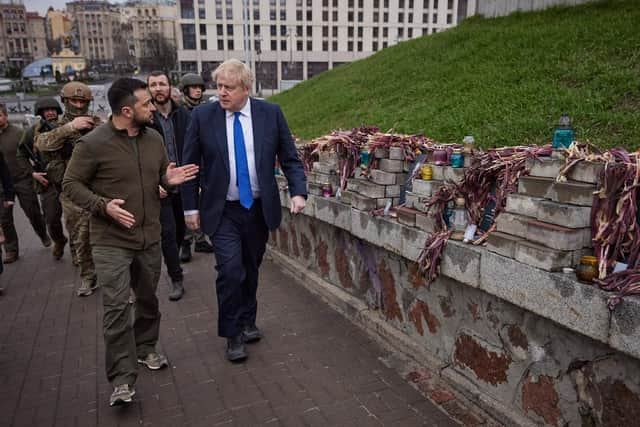Boris Johnson’s Global Britain is beginning to take shape - Brian Monteith
A claim aimed at patriots who think Britain can do good in the world and people of international commerce that seek stability and predictability so they can go about their business – it assumed the status of a no-brainer argument. The UK would lack heft and be isolated if it was on the stage itself – who could possibly think otherwise?
Well, a number of us did, we pointed to the poor record of the European Union on the diplomatic stage due to its difficulty of agreeing a common policy, and even if it overcame that hurdle, it had a reputation for failing to maintain its position for long enough to see it through.
Advertisement
Hide AdAdvertisement
Hide AdOne example I liked to quote of how the UK had its own diplomatic brand value that it could rely upon was the relatively new concept of “soft power”, first written about by Professor Joseph Nye of Harvard in the 90s and developed further by him and others after the turn of the millennium. It argued some countries are able to exert influence not just through the hard power of their military capability (especially if they have strategic reach) – but also through the influence of their cultural, economic, educational, scientific and legal contributions around the world.


Various organisations attempted to quantify how soft power might be measured and their results soon demonstrated the UK had real strengths because of our system of commercial law, English being the most common second language in the world, our scientific research, the legacies of our culture, media and sport – from Shakespeare to Scott, Dickens to Rowling, the BBC to the Beatles, football to golf – those attributes, and many more – such as the work of our charities and NGOs, all helping Britain to win friends and influence people.
No surprise then when the first ranking was produced in 2010 the UK was crowned Global Soft Power leader jointly with France. We then went on to win that title again outright in 2012 and 2015 and always challenged for leadership in the other years.
If it were true that leaving the EU would be such a blow to our credibility and reputation then you could expect the UK to tumble down the table, even be relegated from the top ten – but no, quite the reverse – for we won it again in 2018 and in the latest ranking for 2022 came second. In fact the UK has never fallen below third in the Global Soft Power rankings produced by Portland Communications or Brand finance since that referendum in 2016.
Now we have the war in Ukraine where we can assess the influence of different countries to do good. A real test of diplomacy soft and hard, and what is the outcome so far? Well, despite Brexit, despite the self-loathing of the UK by so many who mistake domestic policy failures as the measure of our international standing, the reality of how we are rated outside the EU was summed up by Andriy Sybiha, the deputy head of the Ukrainian president's office, “The UK is the leader in defence support for Ukraine. The leader in the anti-war coalition. The leader in sanctions against the Russian aggressor.”
Boris Johnson, arrived in Kyiv on Saturday without fanfare, without a huge entourage or press corps – the Ukrainian embassy in London only revealing his arrival once he was there. He walked the streets with the President, met Ukrainians and discussed what more help Britain could provide. He confirmed further economic support, guaranteeing an additional £385m in World Bank lending to Ukraine, taking the UK’s total loan guarantee up to £770m. This comes alongside the £394m the UK has already provided in grant aid, to help ensure the continued running of vital humanitarian services for Ukrainians.
Johnson also announced 800 additional NLAW and Javelin anti-tank missiles, new Starstreak air defence systems, 120 Mastiff armoured vehicles to move troops around, anti-ship missiles to help defend Ukrainian ports, additional non-lethal aid including ballistic helmets, body armour and night vision goggles – and removing tariffs and regulatory restrictions on imports from Ukraine to help lift its economy. The last initiative would have been impossible were the UK still in the EU’s Single Market and Customs Union.
Zelensky has also praised the efforts of the British government to push for more and faster sanctions – in stark comparison to Germany ensuring that an EU ban on Russian coal would not happen for 120 days. From helping the Ukrainian government in January by flying around German airspace to deliver much needed anti-tank missiles and other vital defensive equipment – to campaigning for sanctions and introducing bans and the freezing of Russian access to markets – the UK has been winning friends, just as it did with its distribution of the Covid vaccines last year.
Advertisement
Hide AdAdvertisement
Hide AdBe it as a soft power, winning friends for life and working to open-up hearts and minds – to demonstrating hard power by always meeting our NATO obligations and deploying RAF squadrons in Estonia or Romania (still defending EU countries when we are not a member) the UK remains at least as influential as before the referendum. I would argue that because we are free to now act more quickly without waiting on others or our efforts being emasculated, we are able to set the tone and provide a moral stance for other countries to follow. That is the Global Britain I was hoping for and one that is now beginning to be realised.
Brian Monteith is a former member of the Scottish and European Parliaments and is editor of ThinkScotland.org
Comments
Want to join the conversation? Please or to comment on this article.

